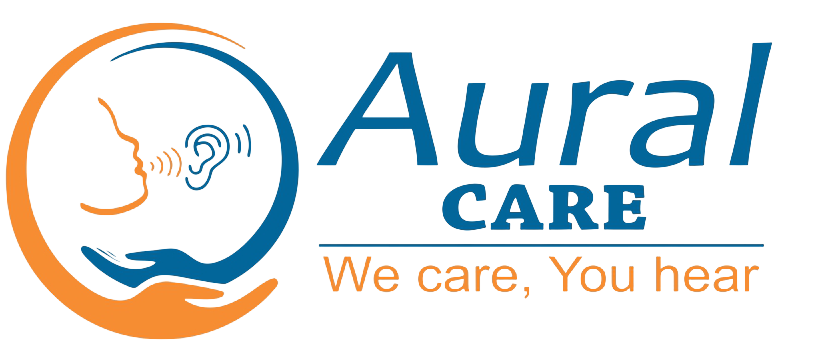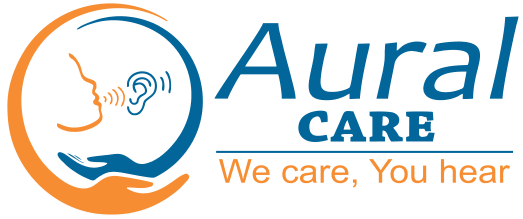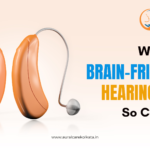Hearing is a cognitive skill that depends on the brain’s ability to comprehend sound, not just an auditory process. Conventional hearing aids enhance sound, but they frequently do not assist the brain’s function in understanding speech and lowering mental strain. On the other hand, by maximizing sound clarity, contrast, and neural adaptation, brain-friendly hearing aids improve cognitive and auditory function.
Research in cognitive hearing science reveals that untreated hearing loss increases cognitive load, auditory fatigue, and even accelerates cognitive decline. Advanced hearing aids, designed with neuroplasticity-based processing, improve speech perception, reduce mental strain, and promote overall auditory health.
Using Neuro-Friendly Hearing Aids is crucial for preserving cognitive health and quality of life because hearing loss is intimately related to brain function. Untreated hearing loss increases the risk of dementia by 200–500%, according to studies, underscoring the need for brain-focused hearing aids.
Today, we explore why Mind-Supportive Hearing Devices are so important, how they support cognitive function, and the long-term benefits they offer for mental well-being.
How Brain-Friendly Hearing Aids Support Cognitive Function
The Connection Between Hearing and Brain Health
Hearing is significantly influenced by the brain. The brain processes and interprets sound as it enters the ears, enabling us to comprehend speech, identify noises, and carry on conversations. Naturally, Cognition-Enhancing Hearing Aids are made to facilitate this process.
- Studies indicate that hearing loss can shrink brain volume by 30% faster than in those with normal hearing.
- When hearing declines, the brain works harder to fill in missing sounds, leading to cognitive overload.
- Individuals with untreated hearing loss have a 24% increased risk of cognitive decline compared to those using hearing aids.
By stimulating the brain properly, Neuro-Friendly Hearing Aids prevent auditory deprivation, keeping cognitive functions sharp.
Reducing the Risk of Dementia
There is a close connection between dementia and hearing loss. According to a ground-breaking study from Johns Hopkins University, the risk of dementia is 500% higher for individuals with severe hearing loss and twice as high for those with modest hearing loss.
Here’s how Mind-Supportive Hearing Devices help:
- They ensure the brain continues to receive the full range of sound signals.
- They reduce cognitive load, allowing the brain to focus on memory, problem-solving, and decision-making.
- Studies show that wearing hearing aids can slow cognitive decline by 75% in older adults.
Features That Make Hearing Aids “Brain-Friendly”
Natural Sound Processing
Unlike traditional devices that simply amplify sound, brain-friendly hearing aids use AI-driven technology to mimic natural hearing. They provide:
- Spatial awareness – Helping users identify where sounds are coming from.
- Automatic background noise reduction – Making conversations clearer in noisy environments.
- Adaptive speech recognition – Ensuring effortless understanding in various settings.
Binaural Processing for Balanced Hearing
The brain processes sound from both ears simultaneously. Neuro-Friendly Hearing Aids use binaural processing, allowing both devices to communicate with each other in real-time. This leads to:
- Better sound localization, helping users detect voices and sounds accurately.
- Enhanced speech clarity, reducing the strain of processing conversations.
- Reduced listening fatigue, preventing exhaustion from excessive brain effort.
Neural Synchronization for Cognitive Stimulation
Neural synchronization means the brain and auditory system stay in sync. When this synchronization weakens due to hearing loss, people may experience memory issues and slower thinking speed.
Brain-friendly hearing aids keep the auditory system engaged by providing:
- Real-time sound adaptation – Adjusting frequencies for clearer, more natural speech perception.
- Brainwave stimulation – Encouraging neural activity to support memory and cognition.
If you’re looking for a Best Hearing aid center for you or Hearing impairment service in Kolkata, then this is the right place for you.
Contact Us!
The Psychological and Emotional Benefits of Brain-Friendly Hearing Aids
Hearing loss doesn’t just affect communication—it impacts mental health. Research shows that those with hearing loss are:
- Twice as likely to suffer from depression.
- At a 40% greater risk of social isolation.
- More prone to experiencing anxiety due to misunderstandings.
Neuro-Friendly Hearing Aids enhance mental well-being by:
- Restoring confidence – Users feel more comfortable engaging in conversations.
- Reducing social anxiety – Making group interactions smoother and more enjoyable.
- Preventing loneliness – Helping individuals maintain strong social connections.
Who Can Benefit the Most from Brain-Friendly Hearing Aids?
Seniors with Age-Related Hearing Loss
Since aging is linked to cognitive decline, seniors benefit significantly from brain-friendly hearing aids. Research shows that those using hearing aids:
- Experience 50% lower rates of dementia.
- Retain better memory and problem-solving abilities.
- Have a 30% lower risk of depression than those who don’t use hearing aids.
Adults with Noise-Induced Hearing Loss
Exposure to loud environments causes gradual hearing loss, often leading to difficulties in professional and social settings. Mind-Supportive Hearing Devices ensure:
- Improved concentration at work.
- Easier adaptation to different sound environments.
- Reduced mental fatigue from straining to hear.
Individuals with Cognitive Concerns
For those already experiencing mild cognitive impairment, Neuro-Friendly Hearing Aids can slow further decline by:
- Keeping the brain engaged in active listening.
- Improving verbal memory and processing speed.
- Enhancing neural connections that support cognition.
Why Choosing Neuro-Friendly Hearing Aids is a Smart Investment
Many people delay getting hearing aids due to stigma or cost. However, investing in brain-friendly hearing aids is crucial for long-term brain health. Consider the benefits:
- Lower healthcare costs – Hearing loss is linked to a 46% increase in medical expenses due to related health issues.
- Longer independence – Better hearing preserves daily functioning and reduces the need for assistance.
- Higher quality of life – Users report 80% greater satisfaction with Neuro-Friendly Hearing Aids than with traditional models.
Conclusion
Hearing involves the brain as well as the ears. Beyond simply amplifying sound, Mind-Supportive Hearing Devices actively preserve cognitive function, lower the risk of dementia, and enhance mental health. Selecting cutting-edge hearing aids is crucial because research indicates that untreated hearing loss can drastically reduce brain capacity and raise the risk of dementia.
Brain-friendly hearing aids are a wise investment for both hearing and brain health if you or a loved one suffers from hearing loss. For a healthier future, take action now rather than waiting until cognitive decline begins.
Google Location: GB7, 822, Rajdanga Main Road . Opp. GST Bhawan. Kol 700107


